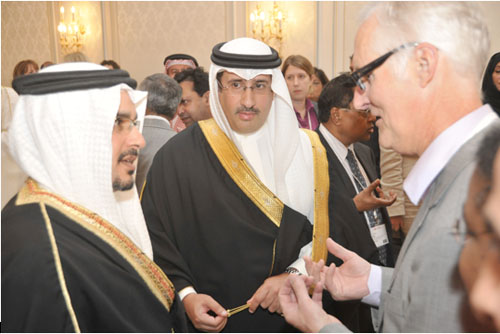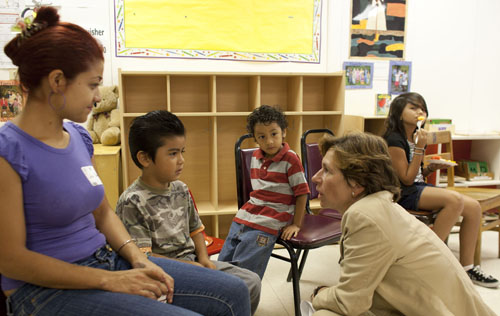
Last Thursday, I attended a dazzling gala to watch special education teacher Matthew Cunningham accept the inaugural GEMS Education Chicago Teacher Award. And yesterday, I listened as Andreas Schleicher presented the key findings from the 2013 Διδασκαλία του ΟΟΣΑ και της Διεθνούς Έρευνας Μάθηση (ΑΥΤΑ).
In the context of Education Fast Forward (ΕΤΑ) Debate 10, “Better Teaching for Better Learning: Results of the OECD Teaching and Learning International Survey (ΑΥΤΑ),” which followed, Lord David Puttnam reminded us all that change is painful. As a young aspiring tennis player with a forehand that needed re-invention, he had learned that lesson the hard way during the 1st round of Junior Wimbledon when it was too late for change.
Change in education has historically taken time, but in an age of innovation when technology is impacting every aspect of our daily lives at a tremendous pace, it is vital to understand the day to day issues faced by teachers globally and move rapidly from a policy standpoint to bring about the changes they need to improve student outcomes.
I asked Michael Fullan, Lord Jim Knight and Pasi Sahlberg to share their perspectives after the Education Fast Forward (ΕΤΑ) Debate 10.
Κύριοι, did the TALIS study ask all the right questions?
Pasi Sahlberg: I think overall, TALIS provides important and interesting comparable insights into the teaching profession around the world. Did TALIS ask ALL the right questions? I think this is a question that probably will divide opinions. My own burning question that TALIS doesn’t shed light on is how the rapidly growing Teach for All movement is affecting teachers and their work, especially in countries that are seeing many of their new teachers coming from these fast-track teacher prep programs. Another theme that remains quite silent in this survey is how significant leadership is in making schools work well. TALIS focused primarily on teachers and much less so on school leaders.
Michael Πλήρης: The TALIS study is valuable to generate a strong debate on the current status of teaching. It fell short because it generated what I call ‘Dangerous Half Truths’ – findings that have some merit but are deficient because they can be easily misinterpreted and result in superficial or harmful policies. Για παράδειγμα, the finding that teacher appraisal/feedback can lead to positive change in classroom practice fails to specify under what conditions this would be true (true if there is a collaborative and growth oriented culture; false if there is a punitive carrot and stick culture). The same problem affects the other big factor examined, Professional Development, which again only is effective when it contains strong pedagogical content and is integrated into the school improvement plans of school leaders and teachers working together.
Lord Jim Ιππότης: Μιλώντας γενικά, Ναί, the study did ask all the right questions. It is always possible to quibble but it remains very insightful for secondary schools. I would have loved to see elementary school data to make a comparison.
What was the most important take home for you?
Pasi Sahlberg: I think the most interesting take-away for me is teachers’ views of the way society values the teaching profession and how wide the gap is between the countries where teachers feel they are valued and where they feel they are not. It is alarming to me that in France, Sweden and Spain, less than one of ten teachers feels valued. This suggests that it is not just more professional development or more pay that will change this dangerous trend, but more fundamental change in the role of how teachers are treated is needed.
Michael Πλήρης: The most important take away was the consistency of findings throughout the report that showed that teacher efficacy and job satisfaction were strongest when teachers work together, and principals work as instructional leaders helping teachers work in collaborative focused ways on the student learning agenda. Δυστυχώς, these findings tend to be underplayed because of the focus on appraisal and professional development. Not enough was made of the more powerful conclusion that improvement happens more deeply and more quickly when school leaders and teachers work together in focused ways on improving learning and achievement.
Lord Jim Ιππότης: The most important take away is the importance of collaboration and feedback to drive development.
What are the key things we need to do to improve the teaching profession?
Pasi Sahlberg: If teachers are to engage in professional development, collaborative school improvement and pedagogical reflection in their work, as TALIS shows successful education systems do, changes in teachers’ working conditions must take place. Σε ορισμένες χώρες, δάσκαλοι’ work loads before professional development and collaboration in school are so big that, in most cases, they don’t have time and energy to do anything else. One thing that should improve is better teacher policies in national education strategies. This includes as much how teachers are prepared as how they should be helped and supported in their work. We should stop thinking that teaching is easy and therefore anyone can be a teacher. Instead we should think that teaching is not rocket science, it much more complicated than that.
Michael Πλήρης: We need to stop counting so heavily on teacher appraisal based on carrots and sticks, and instead build the profession through i) focused intra-school collaboration; ii) focused inter-school learning; iii) standards for students, teachers and school leaders that are developmental driven; iv) transparency of practice and results; and v) generally involving the profession in developing solutions that affect all teachers. The TALIS report skirted around the key dilemma of moving from negative accountability to accountability driven by the group in relation to external requirements.
Lord Jim Ιππότης: We need to incentivise teachers so that they use collaboration in an inventive way versus a mandated way. Teachers should have the right to more time for professional development.
More about EFF Debate 10 including Andreas Schleicher’s presentation.
Michael Fullan is the author of many books on education and a co-author of Επαγγελματική Κεφαλαίου: Ο μετασχηματισμός Διδασκαλία σε κάθε σχολείο. Lord Jim Knight is Managing Director of TSL Education, the largest network of teachers in the world. Pasi Sahlberg is the author of Φινλανδικά Μαθήματα: Τι μπορεί να το Παγκόσμιο Μάθετε από εκπαιδευτικής αλλαγής στη Φινλανδία?


Photo of sky scene is courtesy of GEMS Education
Στο παγκόσμιο Αναζήτηση για Εκπαίδευση, μαζί μου και παγκοσμίως γνωστή ηγέτες σκέψης συμπεριλαμβανομένου του Sir Michael Κομμωτήριο (Ηνωμένο Βασίλειο), Ο Δρ. Michael Block (ΗΠΑ), Ο Δρ. Leon Botstein (ΗΠΑ), Καθηγητής Clay Christensen (ΗΠΑ), Ο Δρ. Linda Ντάρλινγκ-Hammond (ΗΠΑ), Ο Δρ. Madhav Chavan (Ινδία), Ο καθηγητής Michael Fullan (Καναδάς), Ο καθηγητής Howard Gardner (ΗΠΑ), Ο καθηγητής Andy Hargreaves (ΗΠΑ), Ο καθηγητής Yvonne Hellman (Η Ολλανδία), Ο καθηγητής Kristin Helstad (Νορβηγία), Jean Hendrickson (ΗΠΑ), Καθηγητής Rose Hipkins (Νέα Ζηλανδία), Καθηγητής Cornelia Hoogland (Καναδάς), Αξιότιμο Jeff Johnson (Καναδάς), Η κ. Chantal Kaufmann (Βέλγιο), Ο Δρ. Eija Kauppinen (Φινλανδία), Υφυπουργός Tapio Kosunen (Φινλανδία), Ο καθηγητής Dominique Λαφοντέν (Βέλγιο), Ο καθηγητής Hugh Lauder (Ηνωμένο Βασίλειο), Καθηγητής Ben Levin (Καναδάς), Lord Ken Macdonald (Ηνωμένο Βασίλειο), Καθηγητής Barry McGaw (Αυστραλία), Shiv Nadar (Ινδία), Καθηγητής R. Natarajan (Ινδία), Ο Δρ. PAK NG (Σιγκαπούρη), Ο Δρ. Denise Πάπα (ΗΠΑ), Sridhar Rajagopalan (Ινδία), Ο Δρ. Diane Ravitch (ΗΠΑ), Richard Wilson Riley (ΗΠΑ), Sir Ken Robinson (Ηνωμένο Βασίλειο), Καθηγητής Pasi Sahlberg (Φινλανδία), Καθηγητής Manabu Sato (Ιαπωνία), Andreas Schleicher (PISA, ΟΟΣΑ), Ο Δρ. Anthony Seldon (Ηνωμένο Βασίλειο), Ο Δρ. David Shaffer (ΗΠΑ), Ο Δρ. Kirsten Μοναδική Are (Νορβηγία), Στήβεν Spahn (ΗΠΑ), Yves Theze (Lycee Francais Η.Π.Α.), Ο καθηγητής Charles Ungerleider (Καναδάς), Ο καθηγητής Tony Wagner (ΗΠΑ), Sir David Watson (Ηνωμένο Βασίλειο), Καθηγητής Dylan Γουίλιαμ (Ηνωμένο Βασίλειο), Ο Δρ. Mark Wormald (Ηνωμένο Βασίλειο), Ο καθηγητής Theo Wubbels (Η Ολλανδία), Ο καθηγητής Michael Young (Ηνωμένο Βασίλειο), και ο καθηγητής Minxuan Zhang (Κίνα) καθώς εξερευνούν τα μεγάλα ζητήματα της εκπαίδευσης εικόνα που όλα τα έθνη αντιμετωπίζουν σήμερα.
Η Παγκόσμια αναζήτηση για την Εκπαίδευση της Κοινότητας Σελίδα
C. M. Rubin είναι ο συγγραφέας των δύο πολυδιαβασμένα online σειρά για την οποία έλαβε ένα 2011 Βραβείο Upton Sinclair, “Η Σφαιρική Αναζήτηση για Εκπαίδευση” και “Πώς θα μας Διαβάστε?” Είναι επίσης ο συγγραφέας του μπεστ σέλερ τρία βιβλία, Συμπεριλαμβανομένων Η Ρεάλ Αλίκη στη Χώρα των Θαυμάτων, Είναι ο εκδότης του CMRubinWorld, και είναι ένα Ίδρυμα Fellow δι'υπερήχων.
Ακολουθήστε C. M. Rubin στο Twitter: www.twitter.com/@cmrubinworld






Πρόσφατα σχόλια